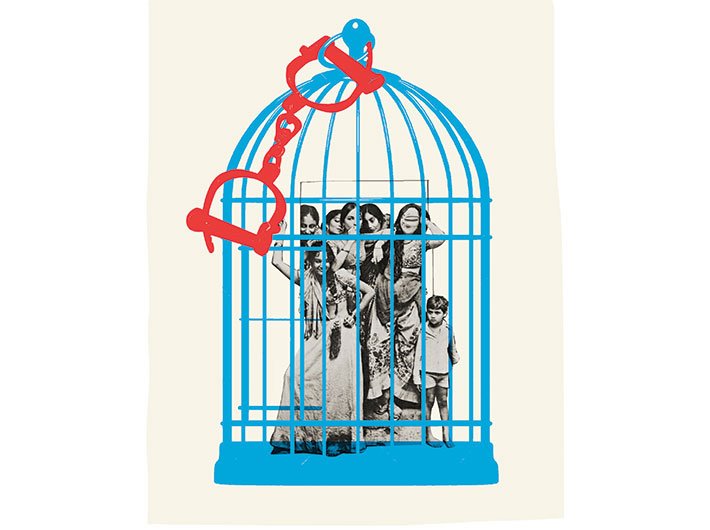Sex and human trafficking is systemically bound to corruption in the police. But keeping the police out completely is not the solution
After almost a decade of deliberations, the Trafficking of Persons (Prevention, Protection and Rehabilitation) Bill, 2018, was passed by the Lok Sabha in July. It is a bill that has sparked debates among politicians and social activists. What’s more, probably for the first time, the debates have seen opposing groups uniting: activists who have been fighting for legalisation of prostitution are in agreement with abolitionist activists who demand criminalisation of all forms of prostitution. Both groups feel that the bill is not based on a human rights framework and its confusing language and ambiguities will endanger vulnerable people even further.
They also agree that the bill confers enormous authority and responsibility on the police and that this is counterproductive to what is required to deal with the phenomenon of trafficking. The apprehension of misuse and abuse of the law by law enforcement agencies stems from over decades of activists’ work, in which they have seen at close quarters the nexus of corruption between law enforcement agencies and the sex trade. It is a systemic phenomenon, unofficially institutionalised, and not just the aberration of a few corrupt officials.
Across India, activists have found a strong economic nexus between police stations and brothel owners/managers and pimps. Bribes are extorted from traffickers, ‘madams’ and pimps; refusal results in raids, arrests, persecution of sex workers in the name of rescue, even though they may not wish to be ‘rescued’. Trafficked girls and women rescued from brothels by activists speak of police personnel coming regularly to collect bribes, and often demanding free sex. Anti sex-trafficking activists who work closely with police to conduct rescue operations to free children and trafficked women from forced prostitution complain that any information shared with the local police station invariably leads to leaks and the rescue effort fails. It must be said, though, that when operations are organised in conjunction with the detective departments, special cells, or anti-trafficking units, the success rates improve. Activists also acknowledge the initiative and determination of superintendents of police level in rescuing minors and trafficked persons. This only reinforces the fact that thana-level corruption related to trafficking is not individual-driven. It is chronic. Transfers of officers caught taking bribes does not interrupt the extortion system and the flow of money. The phenomenon transcends borders and states.
The money flow from the sex trade does not stop at the local police station; it fills the coffers of other vested interests and power holders in the locality. It is only in a few places, where sex workers have organised themselves into groups, that they have been able to challenge such extortion and abuse of power. The experience of these organisations is that law enforcement agencies – patriarchal and prejudiced against sex workers – have no sympathy or protective intentions toward sex workers. They will use and abuse any law to persecute the community for financial gain.
Setting it right
Here’s an irony that applies across all departments of government: isn’t it a frightening thought that the government has to make laws with the inherent assumption that its enforcers will abuse them? And how horrifying it is to consider that this is true even of laws aimed to check such inhuman practices as sex and human trafficking?
The tainting of the law enforcement system as being all corrupt and evil reflects a lack of systemic understanding of how corruption works in systems, and when and how systems continue to work despite corruption. That the law enforcement agencies may collude with as well as disrupt sex trade apparently seem contradictory. But it’s not. The organisation co-holds both. Therefore, if one believes that the law enforcement system has completely failed or is totally corrupt in implementing anti-trafficking laws, it would be as fallacious as ignoring the fact that corruption plays a major role in the persecution of sex workers and victims of trafficking while protecting the mafia that organises the trafficking and the sex trade.
The new bill has an important provision that officers of the state, if found guilty of willful negligence and dereliction of duty, are liable to be prosecuted. Though accusations of corruption are rife, there are understandably few cases filed by sex workers or brothel operators against police personnel. It may also seem strange that such initiatives have not been taken by activists who have direct knowledge and information of it, and have the resources, expertise and capital to battle on behalf of the vulnerable community. Rarely have such cases been filed with anti-corruption bureaus.
If the ultimate aim of the state and its people is to co-create law enforcement agencies which are accountable to its people and have no scope to abuse the law, then perhaps the way to do it is to strengthen civil society to challenge abuse of power. De-authorising the police for enforcing the law because of chronic corruption is a classic reactive thinking and throwing the baby out with the bath water.
Will the anti-trafficking bill be able to combat and prevent corruption in law enforcement? Not unless the state and activists come together in using the law and its provisions to challenge corruption. The officers to challenge corruption are in place and the law provides power to the people to hold state officers accountable. What may be required is that ideologues should step out of their ideologies and work instead on pragmatics. Some remedies to address the problem could be structural – such as exploring the role of anti-corruption bureaus to monitor the nexus. State-level task forces, along with civil society organisations and sex workers organisations could join hands in monitoring this and providing reports to the home departments.
Sen is a researcher, facilitator and activist who works on issues of gender-based violence.
(The article appears in September 15, 2018 edition)
